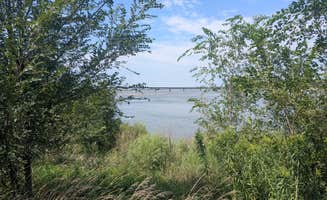Dispersed camping near Yankton, South Dakota provides access to remote riverside locations along the Missouri River basin. Camping areas in this region sit at approximately 1,200 feet elevation, with summer temperatures averaging 75-85°F during peak camping season. Most dispersed sites require self-sufficiency as infrastructure remains minimal throughout the wildlife management areas that constitute the main rustic camping options in the region.
What to do
Fishing opportunities: The Mulberry Bend Wildlife Management Area offers direct river access for anglers. "Next to Vermilliom river. 1 picnic table, pit toilet, boat ramp. Easy to get to. Well maintained gravel road," notes Travis A., highlighting the convenient water access.
Wildlife observation: The conservation areas around Yankton serve primarily as wildlife habitats rather than dedicated campgrounds. Primitive camping near Yankton comes with excellent opportunities for bird watching and wildlife photography, particularly during migration seasons.
Supply runs: Necessary provisions can be accessed without lengthy travel. "Walmart is 5.3 miles away," mentions Travis A. about staying at Mulberry Bend, making it practical to restock supplies during extended stays at these primitive sites.
What campers like
River views: The scenic aspects of the Missouri River provide a primary draw for primitive camping near Yankton. According to Jessica K., Mulberry Bend Wildlife Management Area offers "Great views and breeze of the Missouri River," creating a pleasant natural setting.
Adequate space: Despite being a wildlife management area rather than a designated campground, Mulberry Bend can accommodate multiple vehicles. "Not a very large spot but enough room for 6 or 7 rigs," reports Travis A., indicating sufficient space for small to medium camping groups.
Overnight tranquility: Low traffic during evening hours creates peaceful camping conditions. Lynn notes, "A few people stopped by the boat ramp but no one else stayed the night," suggesting that while day visitors use the area, overnight camping remains relatively quiet and uncrowded.
What you should know
Insect preparation: Summer months bring significant insect activity to riverside camping areas. "Lots of mosquitos and flies made me stay indoors," warns Lynn about Mulberry Bend Wildlife Management Area, emphasizing the need for proper insect repellent and protective measures.
Signage limitations: The camping status of these areas often lacks clear documentation. Multiple reviews mention the absence of camping-specific signs. As Lynn states, "I looked everywhere and saw no signs regarding camping here and I was not disturbed," indicating the unofficial nature of these camping opportunities.
Mixed reports: User experiences vary significantly depending on timing and conditions. Rick M. comments, "I almost skipped this spot because people were complaining about it being roped off or closed, or it didn't look safe or whatever, and it couldn't be farther from the truth," suggesting conditions may change or perspectives differ among campers.
Tips for camping with families
Water procurement planning: No potable water exists at these rustic sites. Rick M. suggests at Wiseman Wildlife Management Area, "if you can do water procurement, there's the Missouri River," though families should bring ample drinking water as river water requires proper treatment.
Toilet facilities assessment: Bathroom options remain minimal and basic. Jessica K. notes about Mulberry Bend, "I see a vault toilet but didn't try it," indicating the presence but uncertain condition of sanitation facilities that families should consider before arrival.
Short-stay recommendation: The limited amenities make these areas better suited for brief camping trips with children. Travis A. describes Mulberry Bend as a "Nice spot to overnight for a day or two," suggesting families plan for shorter visits rather than extended stays.
Tips from RVers
Road conditions: Access roads require careful navigation, particularly for larger vehicles. Rick M. reports in his review of Mulberry Bend Wildlife Management Area, "No problem at all getting my bus in here," though smaller rigs generally report easier access than larger ones.
Self-containment necessity: The absence of hookups requires complete self-sufficiency. Dennis N. relates, "from where I come from this is considered a boat landing not a camping spot still going to Camp here don't want to keep driving," highlighting the compromise some RVers make when utilizing these non-designated camping locations.


